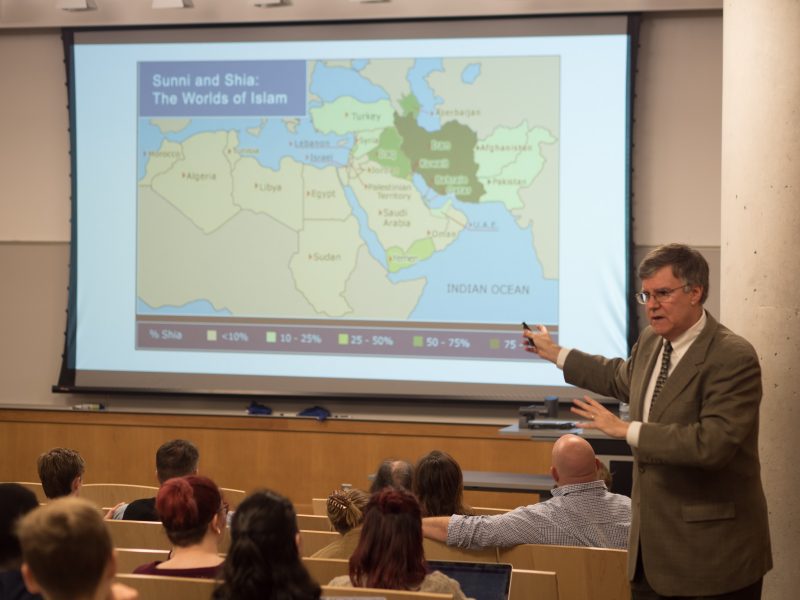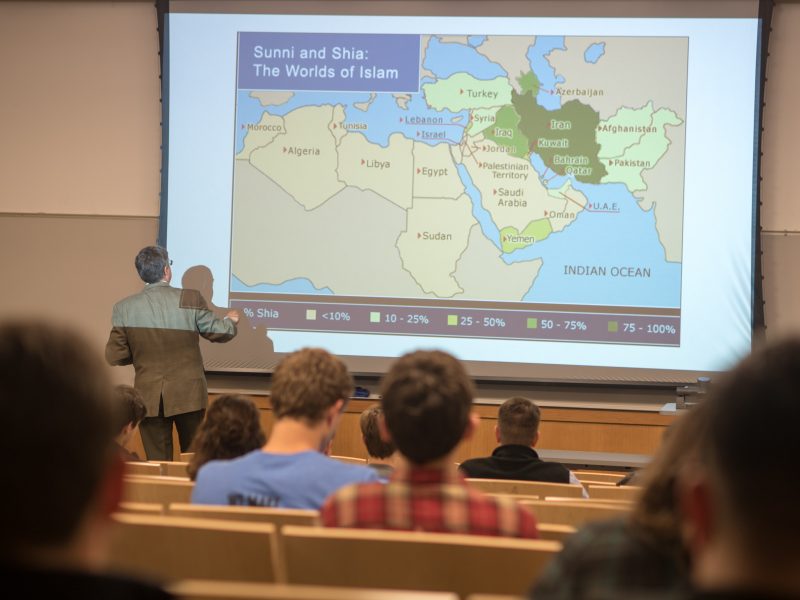In his lecture The New Middle East Cold War, F. Gregory Gause attempted to explain the causes of the current Middle Eastern political crisis by focusing on the effects of destabilizing states.
Gause is the professor of international affairs and head of the international affairs department at Texas A & M University’s Bush School of Government and Public Service, and he is regarded as one of the most knowledgeable voices on Saudi Arabia and the Persian Gulf.
David Lesch, Trinity professor of history, introduced the lecture, which occurred Feb. 21 in the Northrup basement. Lesch and Gause have been colleagues since they attended graduate school at Harvard together.
Gause began the lecture by defining the concept of a “New Middle East Cold War.”
“It’s a hot war in that people are dying, but it’s a cold war in that we are not seeing state-to-state fighting,” Gause said. “This is a war fought out through proxies. This war is also being fought out specifically in the policies of weak Arab states.”
According to Gause, this war is a modern version of the Arab Cold War in the 1950s and 1960s, which also involved indirect warfare and attempts to influence the policies of weak states, much like the Cold War that occurred between the United States and Russia during the same time period.

Gause broadened the scope of the new war to “Middle East Cold War” because the new war involves actors like Turkey and Iran who would not consider themselves to be Arab.
In the lecture, Gause argued that the crisis is not due to sectarianism, which is generally defined as excessive attachment to a religious sect. In the Middle East, the primary sectarian conflict is between the Sunni and Shia sects of Islam.
Gause cited the facts that countries without sectarian tensions have been afflicted by the crisis, and that in many cases, the divisions are along ethnic or ideological fault lines rather than religious sects. The main players, Saudi Arabia and Iran, both claim that they are above sectarianism and accuse the other side. Disputes between members of the Sunni faith also prove that the conflict cannot be explained by sectarian rivalry alone, according to Gause.
He claimed that, instead, the current situation is due to a breakdown of state authority, and the ensuing power vacuum is what leads to a rise in sectarianism.
“When the states break down, it can no longer provide what states are supposed to provide, which is first and foremost security. When the state can’t provide security, where do you go for protection?” Gause asked. “That’s where sectarianism comes in. … People go to communities for the requisites of everyday live. In many countries, those communities tend to be sectarian.”
Other countries, such as Lebanon, do not have strong sectarian affiliations.
“Lebanon is the dog’s breakfast of religion. It has Sunni Muslims, it has Shia Muslims, it has Droos Muslims, and it has every possible variety of Christian you can imagine,” Gause said. “If you want to study the history of ancient religions, you can go to Lebanon because they all still exist.”
Politically weak and fragmented countries like Lebanon are under ideological siege from Iran, which Gause characterized as the “winner” of the new Cold War. Like Egypt in the previous Arab Cold War, Iran has been able to seize political control of weaker states with a combination of ideological persuasion and force.
Saudi Arabia, on the other hand, is the “loser” of the war: despite having more money, they have no personal troops, and few reliable regional allies.
The Obama administration was characterized by a reluctance to engage with the Middle Eastern political situation. Instead, the administration focused on forging a nuclear deal with Iran and opposing terror-based organizations like ISIS and Al-Qaeda. The Trump administration may be tougher on countries like Iran as well as ISIS and Al-Qaeda. However, Trump’s “America First” concept implies that the United States may be less active in Middle Eastern countries. Gause speculated that the administration may still be “putting the pieces together” and considering what course of action to take.
Junior Simba Machingaidze attended the event and explained the importance of staying informed about international politics.
“I think, given the political situation we have, it’s important to have a wider breadth of knowledge, especially for foreign relations students who can take up positions and create change,” Machingaidze said. “And especially being American, that’s a huge reason why education is important.”
Jack Shull, a Trinity alum who graduated in 1982, also emphasized how learning about the world can help people to make better choices.
“With regards to this subject, there are so many opinions,” Shull said “We want to learn so that we don’t make the same mistakes.”
Students interested in the topics covered in Gause’s lecture can read his numerous books, “The International Relations of the Persian Gulf,” “Oil Monarchies: Domestic and Security Challenges in the Arab Gulf States,” and “Saudi-Yemeni Relations: Domestic Structures and Foreign Influence.”







